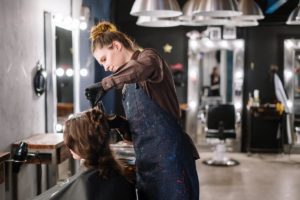When establishing or running a hairdressing business in the UK, it’s important to ensure you’ve met all the legal requirements. Our legal team specialises in helping small businesses and startups with all their legal needs, from contracts to intellectual property protection and privacy. Get in touch today!
Yes, in some cases, you will need a licence to run your beauty business in the UK. The type of licence required depends on your location within the UK and the specific beauty services you wish to offer.
For example, the following beauty professions typically require a licence:
- Cosmetologist
- Esthetician
- Nail technician
- Barber
- Massage therapist
To find out more about the specific licensing requirements for beauty professionals in the UK, you can visit the Department for Business, Energy & Industrial Strategy website or contact your local council for guidance tailored to your area.
To establish a beauty business in the UK, you will need to prepare and register a variety of legal documents. Key requirements include:
- Registering your business name with Companies House (https://www.gov.uk/government/organisations/companies-house).
- Obtaining Employers' Liability Insurance and business insurance (e.g. public liability, professional indemnity).
- Securing Local Authority approval (if operating from a commercial premise) and a lease agreement (if renting premises).
- Having Health and safety policies and procedures in place, in compliance with the Health and Safety Executive (HSE) guidelines (https://www.hse.gov.uk/).
- Complying with privacy and data protection policies and procedures, in line with the UK General Data Protection Regulation (UK GDPR) and the Data Protection Act 2018 (https://ico.org.uk/).
- Registering for a Unique Taxpayer Reference (UTR) number and, if applicable, for Value Added Tax (VAT) with HM Revenue & Customs (HMRC) (https://www.gov.uk/government/organisations/hm-revenue-customs).
- Applying for the relevant licence (depending on the nature of beauty services you're providing), which may involve contacting your local council (https://www.gov.uk/find-local-council).
Your IP is often the key to your business' success. In a software or technology business, it's important to keep your IP secure. To effectively protect your creative works, you'll need to understand the type of IP you intend to keep secure and the specific process required.
Copyright protection applies automatically to creative, original works in the United Kingdom (however, you may still wish to display copyright disclaimers for clarity!).
For further legal protection, you can also register a trade mark with IP United Kingdom. This lists your IP on an online register and prevents other people from using it - so it's officially and legally yours.
There is also the option to patent your IP, but there is a very specific criteria for doing so. Our IP lawyers can guide you through your options.
If you have suppliers for your clothing business, it's important to capture the details of your arrangement in writing. This way, if anything goes wrong in the supply chain, you can refer to the agreement and settle any matters or disputes smoothly.
A Supply Agreement will generally cover payment terms, the goods being delivered, quality expectations, timeframes, termination rights and warranties.



















